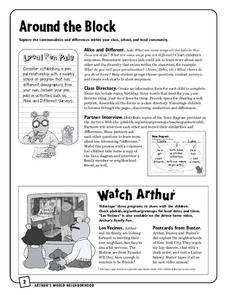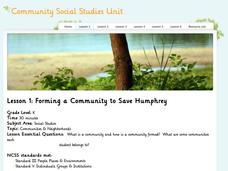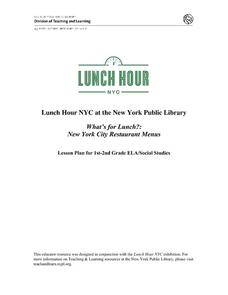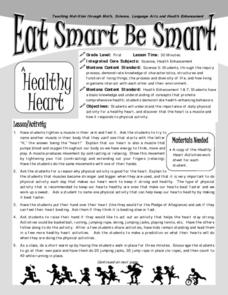Nevada Outdoor School
Let It Snow! Let It Melt!
Winter weather offers a great opportunity to teach young scientists about the states of matter. This activity-based lesson includes a range of learning experiences, from experimenting with the rate at which ice melts to singing a song...
All for KIDZ
Giraffes Can’t Dance Concepts: Giraffes Can't Dance
Teach young children that with a little perseverance and the help of a good friend, anything is possible. This two-part lesson series based on the book Giraffe's Can't Dance starts with a shared reading about Gerald and his attempts to...
PBS
Around the Block
Arthur and his friends help children explore the concepts of family, community, and diversity in a fun series of activities. From performing peer interviews to mapping out the different places students have lived or visited, this...
May Media Group
Treatment Plants
Young scientists explore nature's water treatment plants in this simple science demonstration. By placing a stalk of celery in a cup of water mixed with food coloring, children are able to observe how plants absorb nutrients and...
Community Social Studies Unit
Lesson 1 - Community Social Studies Unit
Some problems are so big it takes an entire community to solve them. So was the case in the children's book Humphrey the Lost Whale: A True Story by Wendy Tokuda and Richard Hall. This primary grade lesson uses a class read-aloud of this...
All for KIDZ
Building Relationships: The Orphan of Ellis Island
Family and friendship are two very important themes of the historical fiction novel The Orphan of Ellis Island by Elvira Woodruff. From video clips and writing prompts to reader's theater and family interviews, this resource provides...
Critical Thinking Cooperative
Doing Our Share
Whether at home or in the classroom, each member of a community has certain responsibilities they must tend to. With the help of the children's story Piggybook by Anthony Browne, kids learn how to assign jobs in a fair and safe manner...
Curated OER
“I Can” Common Core! 2nd Grade Speaking & Listening
"I can" statements are a great way to break down the discrete skills within a set of standards for young learners. Included here are the Common Core standards for second grade speaking and listening broken down into a check list of "I...
Curated OER
A Season for Chapters
Art, music, poetry, and the beauty of the seasons is what you'll find in this very nice unit idea. You can use any of the suggested books and activities to engage your second graders in an exploration of the changes that take place...
Asian Art Museum
Defining "Home"
Open-ended dialogue and guiding questions lead children through a discussion about the relationship between physical objects and personal identity. They analyze the work of two contemporary Japanese artists who have use their mediums to...
New York Public Library
What's for Lunch?: New York City Restaurant Menus
Do you remember the days when a cup of coffee cost five cents? At A.W. Dennett restaurant in 1894, you could buy a five-cent cup of coffee and as well as a five-cent slice of pie to accompany it. The menu from that year is a primary...
Curated OER
Lesson 3: Idioms
You're as cute as a bug. But are you really as cute as a bug? Bugs aren't cute! Idioms are fun nonliteral phrases that mean something different than the words they contain. Second graders learn about idioms as they read the book, More...
Curated OER
Text Clues and Prior Knowledge
Explore making predictions as a reading strategy. As a class, read "Blue Light, Green Light," stopping to make a prediction. After recording a prediction on the graphic organizer, discuss the thoughts behind your idea. Then, continue...
Curated OER
What is a Philanthropist?
What does a philanthropist do? Help your class explore philanthropy using character development and literacy ideas. Learners will define and give examples of philanthropy, listen to The Lion and the Mouse, discuss how the characters help...
Curated OER
Using Compare and Contrast Key Words
Compare and contrast while challenging your class with this higher-level thinking and reading comprehension lesson. After observing the teacher model comparing and contrasting bats and birds, learners read passages about two towns. They...
Growing Minds
Apple Exploration
Turn your classroom into a farmers' market! Reading Applesauce Season by Eden Ross Lipson or Monica Wellington’s Apple Farmer Annie, launches this investigation of apples, farmers' markets, and the people selling products. The class...
Montana Office of Public Instruction
Eat Smart Be Smart
Get children's blood pumping with this primary grade lesson on the human heart. After learning about the important role this muscle plays in the human body, students monitor their heart rates and discover the importance of staying active.
Curated OER
Lesson 1:Using Headings to Determine the Main Idea (nonfiction)
Sometimes all you need is a good heading to determine the main idea in a block of text. Young readers learn how to use headings to guild them to determining the main idea. They practice as a class, in pairs, and then on their own. The...
Curated OER
Cause and Effect Relationships
Cause and effect relationships can be found in life and in literature. Enthusiastic readers will find and discuss all of the cause and effect relationships in the story, Alexander and the Terrible, Horrible, No Good, Very Bad Day. The...
Curated OER
Lesson 1: Author's Voice in a Poem
Second graders use the title and text clues from a poem to determine what the author's voice is. In this author's voice instructional activity, 2nd graders participate in a directed instructional activity using the poem "Amazing Bats."...
Curated OER
Distinguish Fact from Opinion in Passage
Is it a fact or is it an opinion; readers need to know. Second graders learn a new technique to determine if a sentence or reading passage is fact based or opinion based. They read and then ask evidence based questions to determine if...
Curated OER
Oklahoma Stone Soup
Class members complete activities related to the story "Oklahoma Stone Soup." First, pupils read, discuss, and answer questions about the story. Next, to incorporate math into the lesson, learners make stone soup using a variety of...
Alabama Learning Exchange
No More Money Trouble
Young consumers explore money identification and counting. In this cross-curricular money instructional activity, they participate in comprehension and writing activities prior to and after reading the book Money Trouble by Bill Cosby....
Creative Educator
Amazing Animal Alliterations
Creatures can cause creativity! Alliteration can make writing more enjoyable and entertaining. Help your pupils grasp this concept by using animals as inspiration for alliterative sentences. Prepare your class for the activities by first...

























